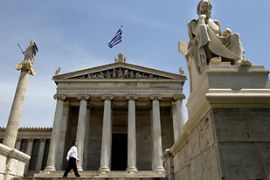Eurozone approves Greek debt deal
Leaders in Brussels reported to have approved $140bn of loans to debt-ridden country.

Going forward, the leaders agreed to “reinforce” the pact that limits public deficit and debt levels as a ratio of national output, after 13 out of the 16 euro countries breached their commitments in the wake of the global financial crisis.
However, the diplomatic source said precise measures, which could include the suppression of voting rights or access to EU support funding, had still to be agreed.
Better co-ordination
Earlier on Friday, Germany’s parliament agreed to provide up to $28.6bn over three years as their contribution to an emergency loans package for debt-ridden Greece.
The lower house’s decision, passed by 390 votes in favour and 72 against, with 139 MPs abstaining, followed days of delays.
| in depth | |||||||||||||||||||||||||||||
|
Wolfgang Schauble, Germany’s finance minsiter, told MPs that the contribution had to be approved in order to preserve the euro currency.
“Any other alternative would be much more expensive for the Germans, would be much more dangerous, would carry much bigger risks,” Schaeuble said.
He said experts agreed that “it would be disastrous to risk … a member of the European currency union, Greece, now becoming insolvent”.
The bill will now go to the parliament’s upper house and then to Horst Koehler, the president, before becoming law.
Germany’s contribution is part of a $146bn package to bail out Greece, which is struggling to access money on the open market, where it is increasingly viewed as a risky investment.
Late on Thursday, France’s senate approved their nation’s contribution to the EU loan package, providing up to $22.5bn over the next three years.
The debt crisis in Europe has caused fears that finance will dry up in other areas of the world.
The Bank of Japan said on Friday that it would offer two trillion yen ($22bn) in short-term loans to commercial banks to boost liquidity.
Other eurozone nations – particularly those with high debt, such as Spain, Portugal and Italy – worry that they’ll be unable to find financing. Spain did announce on Friday that it had formally pulled out of recession in the first quarter of 2010, with growth of 0.1 per cent.
